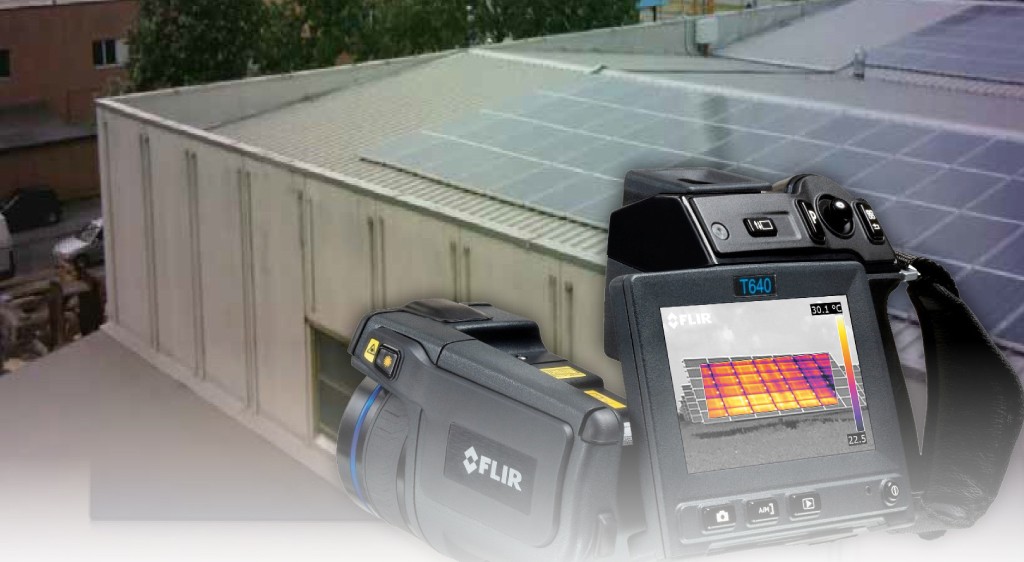Inspecting roof-mounted solar panels with thermal imaging
By EPR Magazine Editorial December 11, 2018 11:15 am IST
By EPR Magazine Editorial December 11, 2018 11:15 am IST

The sales of solar panels are soaring, which helps to reduce CO2 emissions at electricity plants. Over time, solar panels may develop defects, which can be easily fixed if detected on time, but can cause a severe drop in energy production and in some cases even start a fire if left unchecked. That’s why more and more solar panel installers cooperate with experienced thermographers that offer regular thermal imaging inspections to ensure the safety and effective deployment of solar systems.
As the temperatures rise, solar panels become less efficient, producing less electricity. Some defects can cause them to break down or even produce a reverse current, which might damage the entire solar plant. Thermal imaging cameras can be used to detect hotspots in the panels from a distance, which makes it a lot easier to find defects before they become devastating breakdowns.
The Italian solar panel installation firm ELEM SRL is one of the companies that is working together with Thermographic SAS di Ermoni Alberto e C, an experienced thermographic inspection agency to offer thermal imaging inspections to their clients. This Italy-based thermography agency offers thermographers with several decades of experience with thermography. One of these inspectors is Alberto Ermoni, a Level II certified thermographer.
“Thermal imaging cameras from FLIR Systems are the ideal tool for the inspection of solar panels,” says Ermoni. “This inspection method is non-destructive and non-invasive. You can use thermal imaging to inspect the solar panels under load, so no shutdown is required. When used properly, thermal imaging cameras will show accurate temperature differences between cells or within a single cell that allow you to identify faults in an early stage.”
Inspect the entire system
These inspections are also not limited to the solar panels alone. “You can use thermal imaging to inspect the entire system, from the solar panels themselves to connections, inverters, fuses and all other electrical components in the system”, explains Ermoni. “If any part of the system starts to wear down or develops a higher resistance for some other reason, the corresponding increase in temperature can be detected very easily with a thermal imaging camera, so you can fix the problem before the system fails.”
The thermal imaging camera Ermoni uses for these inspections is the FLIR T640bx. This camera combines top notch image quality with advanced features such as wireless WiFi connectivity with a tablet PC, and a wireless Bluetooth connection to selected Extech test and measurement tools with the MeterLink feature such as the Extech EX845 clamp meter. These wireless connections really make a huge difference. Another feature that has been used often is the picture-in-picture feature. This overlay of a thermal image over the visual image allows to better localise the hot spots.
Wireless connection with Tablet PC or smartphoneThe MeterLink connection over Bluetooth allows the FLIR thermal imaging camera to automatically embed measurements from selected Extech measurement devices with the MeterLink feature, making writing down the measurements on a piece of paper redundant. This not only speeds up inspections, but also reduces the risk of human errors.
Interchangeable lenses
Another important factor in Ermoni’s choice for the FLIR T640bx thermal imaging camera is the fact that it has interchangeable lenses. “In some cases, you are standing on a raised platform inspecting solar panels from a distance of 10 meters, but in another situation you might be inspecting the back end of panels from less than one-meter distance. In these different situations you need different optics; a telephoto lens for the inspection from a distance and a wide angle lens for the short distance inspections. Many other thermal imaging camera models do not feature this flexibility in optics.”
Good solar panel inspections require more than just a good thermal imaging panel alone, however, Ermoni stresses, “Performing solar panel inspections properly can be quite a challenge. When you inspect the front panels, you need to know how to choose the right vantage point and viewing angle to prevent reflections, but you also need to know about emissivity and reflected temperature, if you want to get accurate temperature readings”.
ITC certified
For that reason Ermoni has followed several courses at the FLIR Infrared Training Center (ITC). “You really need this type of training to be able to deliver accurate reports”, says Ermoni. After becoming a Level II certified thermographer, Ermoni even became ITC instructor himself. “Having seen the importance of proper training in the field I am eager to share the knowledge I have gained with other thermographers.” To Ermoni, the choice for a FLIR thermal imaging camera was an obvious one. “FLIR offers the whole package: very high quality cameras with advanced features and excellent image quality, good software, very good after sales service and training courses to match.”
We use cookies to personalize your experience. By continuing to visit this website you agree to our Terms & Conditions, Privacy Policy and Cookie Policy.